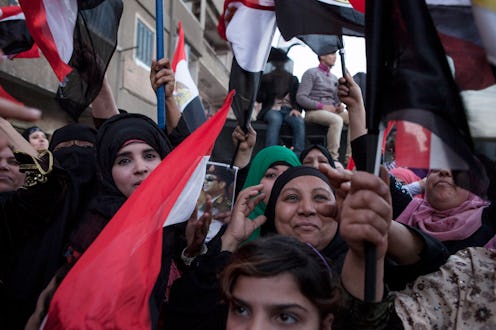News
What You Should Know About Egypt's Referendum
Following a summer of upheaval and turmoil, months of uncertainty and violence, this week, over 20 million citizens voted in a referendum on Egypt's new constitution. On Saturday, it was announced that a whopping 98.1 percent of Egyptians voted “yes." This is a landmark moment: it's the first poll since the military ousted the country's first freely elected leader, and the first major step in taking Egypt from its interim state to a permanent one. Here's the top five things you should know:
1. The Vote's Not as Dramatically Positive as it May Appear
Ok, so 98.1 percent of Egyptians approve of the new constitution — but that result is actually far from surprising. Admittedly, partly it comes because a lot of people were sick and tired of the current situation, and approving the constitution was seen as a clear step forward. But a lot of people weren't really given much of a choice, either: security forces reportedly beat and arrested citizens for hanging “No” posters, the Muslim Brotherhood and its supporters boycotted the polls entirely, and, in the end, only 38.6 percent of registered voters actually hit the ballots. So, yes, a victory of sorts, but one that came from a strangulation of dissent, and which is therefore less than convincing.
2. It's Better than the Previous Constitution in Certain Ways
In spite of the interim government's apparent inability to let go of oppression tactics, some of the wording of the new constitution does offer hope that — assuming it's implemented as written — human rights would see vast improvements. For one thing, it includes an article that commits the state to "achieving equality between women and men in all civil, political, economic, social, and cultural rights." The old constitution had none of that (only having a passing reference to gender equality in the preamble). It also guarantees "the protection of women against all forms of violence" — a pretty big promise for a country that's ranked one of the worst places to be a woman. It has better anti-discrimination provisions than its predecessor, and bans the use of torture in any context.
3. But It's Still Majorly Problematic
Although the charter specifically states that freedom of expression is absolute, the language it uses to define punishable offenses is vague and broadly ranging: "The law shall specify the penalties for crimes related to the incitement of violence, discrimination between citizens, or impugning the honor of individuals." The worry is that the ambiguity of these crimes will undermine the freedom it promise — "It is no better in terms of fundamental rights,” concludes a legal scholar in Cairo at the International Institute for Democracy and Electoral Assistance.
4. The Biggest Issue: It Gives Greater Military and Judicial Powers
Here's where we get to the real crux of the matter: no matter how much the vagueness of the constitution's wording does or doesn't affect human rights, the lopsidedly sweeping military and judicial powers are really what's making this new charter worrying. Under it, the armed forces (and their budget) will be completely autonomous, independent of civilian control for the next eight years, and will have veto power over who gets to be defense minister for the next two presidential terms. The Supreme Court will be able to pick and choose its own members and size. The police will get more independence, and, most scary of all: the military will have the power to try civilians in military courts.
The last constitution had the following sentence in it's preamble: "Our Armed Forces form a patriotic, professional and neutral national institution that does not interfere in political affairs." Unsurprisingly, it doesn't appear in the revised charter.
5. Where It Leaves Egypt Now: Hopeful, but Hypocritical
With the constitution approved, the "road map" issued right after Morsi was ousted suggests that President Adli Mansour will soon issue a decree announcing the schedule for parliamentary and presidential elections — and only last week, army chief General Abdel Fattah al-Sisi announced that he would see a strong yes vote as a mandate to run for office. The general has been seen as a likely contender from the get-go: as the main force behind the takeover in July which ousted former president Mohammed Morsi, many have seen the military leader as the "voice of the people."
So Sisi will likely run, and win. But in spite of all this, and the improvements inherent in the charter, Egypt is still operating under an oppressive framework. Earlier this week, Egyptian police briefly jailed an Associated Press camera crew for allegedly working for Al Jazeera, and a day later, three detained Al Jazeera journalists were charged with "broadcasting false news" that endangered national security. The country is still working from a place of fear; and, because of that, there's a danger that it may become even more oppressive as the military gathers more power.
The constitution is ambitious, and potentially a great step forward. But as Michael Albertus and Victor Menaldo of The Washington Post explain, there still needs to be another big step in Egypt's transition:
This means that if the Egyptian government is to represent all of its people, there must be another future phase of reform. To become a more perfect democracy, Egypt’s next political vanguard will have to wage a different type of revolution, one dedicated to institutional reform. While some of these battles may still be waged in Tahrir Square, many of them will take place behind the scenes and involve lawyers, academics, and other members of civil society – including Islamic clerics – persuading Egypt’s politicians to themselves become the advocates of a fuller version of democracy.
